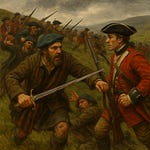Welcome back to "This Day in Scottish History." I'm your host, Colin MacDonald. Today, we journey back to September 9, 1513, to one of the most significant and tragic events in Scottish history: the Battle of Flodden. It was a day that would forever change the course of Scotland's destiny.
The Battle of Flodden, also known as Flodden Field, was fought near Branxton in Northumberland, England. This battle was not just another clash between the Kingdoms of Scotland and England but marked the end of an era. Up to 10,000 Scots lost their lives that day, including King James IV and many of the nation's nobility, in what became a catastrophic defeat for Scotland.
To understand the significance of the Battle of Flodden, we must first look at the political backdrop of the early 16th century. Relations between Scotland and England had been fraught with tension for centuries, despite the Treaty of Perpetual Peace signed in 1502. This treaty was supposed to put an end to the intermittent warfare that had plagued both nations. However, the promise of peace was short-lived.
King James IV of Scotland, bound by the Auld Alliance with France, declared war on England in 1513. At that time, England, under King Henry VIII, was embroiled in the War of the League of Cambrai against France, a conflict that drew much of Europe into its orbit. James saw an opportunity to honor his alliance with France and to strike a blow against an England whose king was preoccupied with a continental campaign. Thus, he gathered an army and marched south into England, capturing several English border castles along the way.
James's army, numbering around 30,000 men, took up a strong defensive position on Flodden Edge, a hill with steep slopes and marshland on either side—an ideal spot for a defensive battle. However, the English, under the command of Thomas Howard, the Earl of Surrey, were not to be outdone. Surrey led his forces on a clever flanking maneuver that positioned them behind the Scots, cutting off their line of retreat and forcing them into a vulnerable position.
The battle began with an exchange of artillery fire, but the Scots’ heavy guns, hastily moved and poorly positioned, were not effective. James then ordered his forces to advance downhill, unknowingly marching them into a marshy area that broke their formation and turned their advance into chaos. This tactical blunder allowed the English troops, armed with shorter, more maneuverable weapons, to engage the Scottish pikemen in brutal close-quarter combat. The long pikes, effective on open fields, were less useful in the boggy terrain and against the English bills—a weapon akin to a large scythe mounted on a pole. The battle quickly descended into a bloody melee.
King James IV, demonstrating his characteristic bravery—some might say recklessness—fought in the thick of the battle. He became the last monarch from Great Britain to die on the battlefield, a testament to his personal courage but also a significant blow to Scottish morale and leadership. His death, alongside the loss of many Scottish nobles, plunged Scotland into a political crisis. The infant James V, just a year old, would succeed his father, leaving a power vacuum that Scotland struggled to fill.
The English losses were significantly lower, around 1,700 men, compared to the devastating Scottish casualties. This stark difference in losses highlighted not just the tactical errors of the Scots but also the effective English use of terrain and strategy.
Flodden’s aftermath was a period of mourning and political instability in Scotland. The loss of so many leaders in one day left the country vulnerable. The death of King James IV also marked the end of medieval Scotland, as the battle is sometimes used by historians to signify the end of the Middle Ages in the British Isles. It left a profound scar on the Scottish national consciousness—a defeat still remembered for its heavy toll.
As we reflect on the events of September 9, 1513, we remember the bravery of those who fought and the lessons learned from this pivotal battle. Flodden was not just a defeat but a turning point that shaped the future of Scotland in profound ways.
Thank you for joining us today on "This Day in Scottish History." I'm Colin MacDonald, reminding you that history is not just about the past, but about understanding our present. Haste ye back for another episode tomorrow, where we'll continue to explore the rich tapestry of Scotland's storied past. Slàinte Mhath!













Share this post